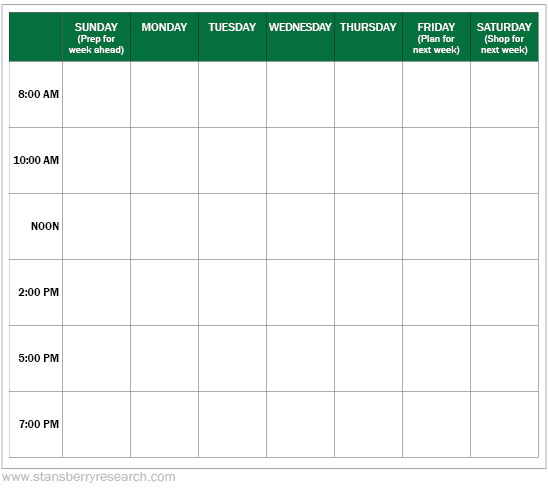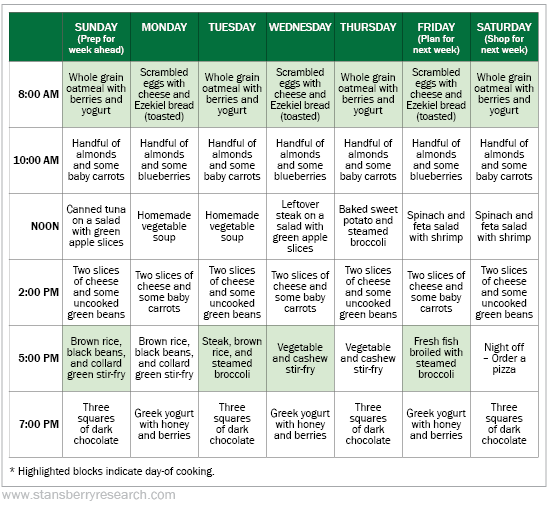The COVID-19 pandemic is ruining our waistlines...
In the past year, cookie sales in the U.S. have risen 20.3%, salty snack purchases have grown 14.8%, and cheesy snack buys are up 11.5%.
Some go so far as to describe their new snacking habits as a "lifeline" during this time of uncertainty... 88% of adults report snacking more than they did before the pandemic, with "seeking comfort" being the No. 1 reason for this change in behavior.
All the while, deep down we know that eating good food makes us feel good.
Fortunately, we can make eating healthier much easier, simply by meal planning...
It's well known that when you're already hungry, making healthy choices is challenging. To fight this, I try to always be sated before taking a trip to the grocery store. I want to grab blueberries and skip the impulsive potato chip purchase.
Turns out, your body produces a hormone when you're hungry called ghrelin. Elevated levels of ghrelin block your brain's ability to make rational decisions and control your impulses. For this reason alone, it's better to make good choices about what to eat long before you're actually hungry.
When you make the effort to plan and prepare meals for yourself ahead of time, you also take the stress out of eating...
No more wasting time trying to decide what you're hungry for. That decision has already been made. No more feeling guilty about eating something you know you shouldn't. You have already made something delicious, satisfying, and nutritious to enjoy.
All you have to do is make a plan and stick to it.
Turns out, a 2017 French study of 40,554 people found that those who meal planned (57% of the participants) adhered better to nutritional guidelines, consumed a larger variety of food, and were less likely to be obese (both men and women) or overweight (women only).
Cooking your own food – as opposed to ordering food or eating out – leads people to eat healthier. A 2014 study observed 9,569 adults over the age of 20. The researchers found that in households where dinner was cooked six to seven times a week, people consumed significantly fewer calories, less fat, and less sugar than in households where dinner was cooked only zero or one times a week.
Meal planning doesn't have to be daunting...
STEP ONE: DECISION TIME
Let's plan out all your meals for one week.
I'm going to give you a concrete example of how to do this. Use this to guide you and follow it as closely as you want. The important thing to remember is that you're going to have to tweak my plan here and there so that it fits your life. Own it and make it your plan, don't just do what I do if you find that it doesn't work for you...
First, grab a weekly calendar to write down the plan on. Each day should have six time slots (this could vary depending on how frequently you typically eat). We're also going to do our planning on Friday, shopping Saturday, and meal prepping Sunday. So, when we first begin, we should have something that looks like this...
This setup is designed to give you three small meals (at 8 a.m., 12 p.m., and 5 p.m.) and three snacks (at 10 a.m., 2 p.m., and 7 p.m.) each day.
For this week, we're going to cook breakfast – because that already fits into our usual schedule – and we are going to prep and portion out our other five meals and snacks each day.
Now, it's time to start filling in the schedule with our food selections. You'll notice each day I make sure to get a variety of good nutrition. You'll also see repeat meals when I know that a dinner recipe can be made to last a few days. (That means less cooking for me.) But I also want to make sure I switch up my meals from day to day so that the plan doesn't get boring. Here's how my week looks...
In this example, you'll see a lot of the same grocery items showing up in multiple places. This is designed to make use of all the groceries you've purchased in preparation for the week.
Review your schedule and see which meals are going to be better cooked on the day of. Highlight your cooking days in another color. You can still prep for these days by gathering your ingredients in advance and storing them together. For items like salad and "something," plan to store the salad in a different container than the "something."
Once you've finished your schedule, post it up on your refrigerator so that you can refer to it quickly and easily throughout the week.
STEP TWO: AQUIRE YOUR RAW MATERIALS
Next, use your selected recipes to create a shopping list and head to the store. Keep in mind that some foods don't last long in the refrigerator... so buying things like fresh meat and fish may mean storing them in the freezer or shopping more frequently, depending on how you've set up your plan.
Consider portion sizes while making your list so you'll know exactly how much to buy at the store. Get specific on your list by using measurements with your line items, like "six ounces of salmon" or "three crowns of broccoli" for example.
After you've purchased your ingredients, it's time to cook and portion out your individual meals. A lot of meal planners I know spend their Saturdays shopping and save the cooking, portioning, and labeling for Sunday in order to prepare for the week ahead.
Give yourself plenty of time for planning – especially while this is still new – so you don't get overwhelmed and frustrated. If you live with other people, make sure to include them in the fun.
And have fun getting organized. You might want to stack your portioned out containers according to the day they are to be eaten. Or you might want to use the left side of your fridge for lunches and the right side of your fridge for dinners. You can even use color coded Tupperware. Do what makes the most sense to you.
I like to use sticky notes on the top of my Tupperware that have the day and time of the contents inside. Then I stack them in the fridge according to when I'll need them... the later part of the week is stored in the back of the fridge, and the containers I'll need first are in the front.
STEP THREE: FOLLOW THE SCHEDULE AND ENJOY
Congratulations! You've done the work, and now it's time to enjoy the benefits of all your preparation.
We'd love to hear about your meal planning tips and stories, too. Drop us a line at [email protected].
What We're Interneting...
- The science behind meal planning.
- Something different: Stunning Astronomy Photographs Look like They're Shot from Space.
Here's to our health, wealth, and a great retirement,
Dr. David Eifrig and the Health & Wealth Bulletin Research Team
March 9, 2021


